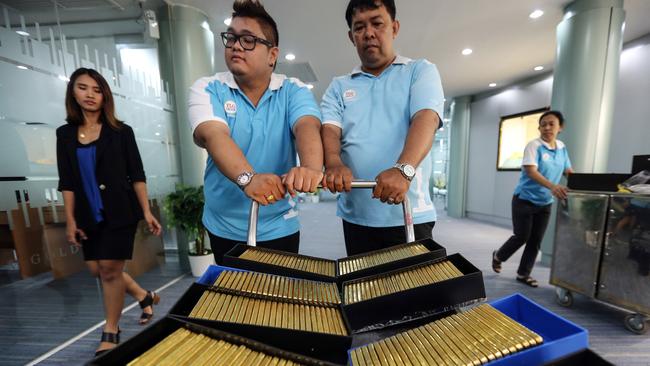Morgan Stanley says ASX 200 will stay resilient
Wednesday’s massive rebound in global shares and plunge in oil prices will be hard to sustain without a successful outcome from Ukraine-Russia peace talks in Turkey.

Business
Don't miss out on the headlines from Business. Followed categories will be added to My News.
Wednesday’s rebound in the global shares and plunge in oil prices will be hard to sustain without a successful outcome from Ukraine-Russia talks in Turkey.
But the argument for Australian shares still stacks up, according to Morgan Stanley.
A strong rise in the local market came despite resources sector falls in response to tumbling commodity prices, underscoring the resilience of the bourse.
After a 7.4 per cent rise in the Euro Stoxx 50 – its best gain in two years – and a 2.6 per cent jump in the S&P 500, Australia’s S&P/ASX 200 rose 1.1 per cent to a five-day high close of 7130.8.
It is down just 4.2 per cent year to date versus 10.3 per cent for the S&P 500 and 12.4 per cent for the Euro Stoxx 50, mainly because of booming commodity prices.
On Monday, Russian President Vladimir Putin conditionally offered to end the war but Ukraine’s deputy chief of staff, Ihor Zhovkva, said the “first and foremost pre-condition for having such kind of negotiations is immediate ceasefire and withdrawal of Russian troops”.
And while Ukraine was open to discussing Putin’s demand for neutrality, it “won’t surrender a single inch” of territory and he wanted security guarantees from neighbours and allies. Ukraine seemed unwilling to accept Putin’s demand for the country’s neutrality and that it recognise Russia’s sovereignty in Crimea and the separatist regions in east Ukraine.
Thursday’s meeting of EU leaders in Versailles might agree on joint debt financing for a “recovery fund” to fast-track green energy and renewables, defence spending and subsides for energy cost, and the European Central Bank might soften its hawkish tilt, but US CPI data for February loomed as a hurdle.
Brent crude oil dived 12 per cent to $US112.86 a barrel, gold fell 2.7 per cent to $US1995.74 an ounce, the US dollar index fell 1.1 per cent and the US 10-year bond yield jumped 9 basis points to 1.936 per cent.
But crude remained supported on dips, jumping as much as 3.8 per cent to $US115.35 in Asian trading.
If the war were about to end, the market might start to build in some normalisation of Western relations with Russia by selling commodities in a sustained fashion. The worst affected sharemarkets would probably leave the local bourse behind as they recovered in that environment.
Also hitting oil prices on Wednesday were reports that the US made progress towards encouraging OPEC+ producers, including Iraq and the UAE, to increase supply, but while Saudi Arabia could turn on the taps many OPEC+ members are missing production targets due to years of underinvestment.
“It is doubtful whether there is enough spare OPEC+ capacity to fill the gap created by the loss of Russian oil imports,” said City Index senior market analyst, Tony Sycamore.
In the event that the global economy enters a recession, he noted that the average decline in the S&P 500 over the past 11 recessions has been 26 per cent versus the current fall of 10.8 per cent. In his view, a more aggressive “risk-on” strategy will only be warranted by regime change in Russia and a break of the recent high near 4420.
After taking into account recent geopolitical tensions and volatility in commodity signals, economists have adjusted their forecasts to reflect higher inflation, but only a modest GDP impact given the offset of commodity exports supporting Australian growth.
“The upshot is that in this calendar year the peer comparison to Asia is a positive one,” said Morgan Stanley Australia equity strategist Chris Nicol.
“Australia sits near the top of the table for GDP growth with a relatively low inflation starting point, a patient central bank and still expansionary fiscal settings.”
Morgan Stanley recommends buying dips in Australia, Singapore and Japan against this volatile backdrop.
Nicol noted the market was now below his year-end target of 7350, with a “compelling yield” and there’s a “solid case” for continued resilience amid volatility.
The ASX 200 now trades on a net dividend yield of about 4.4 per cent, which compares favourably to other higher yielding markets like the UK at 3.8 per cent, Europe at 3.2 per cent and emerging markets at 3.2 per cent.
Nicol said if geopolitical risks were to peak or re-escalate there would be “reasonable expectation for meaningful initial positive corrections across most oversold benchmarks”.
And while the local market may have less upside because of its limited drawdown so far, the relative argument for Australia “still stacks up”, in the event that the market refocuses on continued inflationary pressure, tighter financial conditions and rotational influences on positioning.
Originally published as Morgan Stanley says ASX 200 will stay resilient



